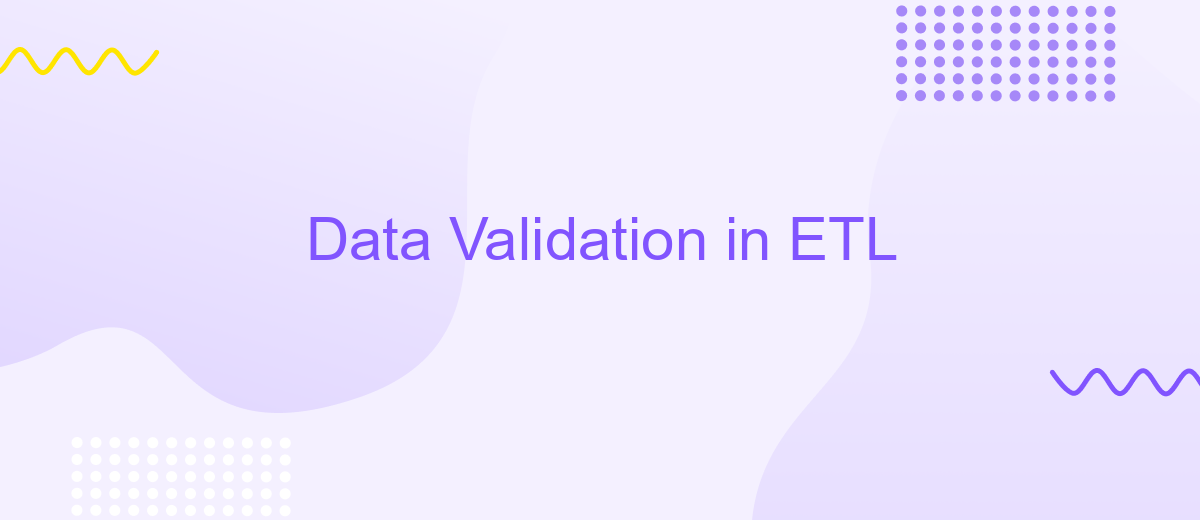Data Validation in ETL
Data validation is a crucial step in the ETL (Extract, Transform, Load) process, ensuring that the data being moved from source to destination is accurate, consistent, and reliable. This article delves into various techniques and best practices for validating data during ETL operations, helping organizations maintain data integrity and make informed decisions based on high-quality information.
Introduction
Data validation is a critical component of the ETL (Extract, Transform, Load) process, ensuring the accuracy and reliability of data as it moves from source to destination. Inaccurate or incomplete data can lead to flawed analytics and poor decision-making, making validation crucial for maintaining data integrity.
- Ensures data accuracy and consistency
- Prevents data loss and corruption
- Enhances data quality for better decision-making
Effective data validation involves multiple steps, including schema validation, data type checks, and integrity constraints. Tools like ApiX-Drive can simplify this process by providing seamless integration and automated validation checks. By leveraging such services, organizations can streamline their ETL workflows, reduce errors, and ensure high-quality data for their analytical needs.
Data Validation Techniques

Data validation in ETL processes ensures that the data being transferred is accurate, complete, and consistent. One common technique is schema validation, which involves checking the data against predefined schema rules to ensure it adheres to the expected format and data types. Another technique is range checking, where values are validated to fall within acceptable ranges. Additionally, uniqueness constraints are applied to avoid duplicate records, ensuring the integrity of the dataset.
For more complex validation needs, integration services like ApiX-Drive can be utilized. ApiX-Drive offers automated data synchronization and validation between various applications and databases. It supports custom validation rules and error handling mechanisms, allowing for real-time data quality checks. By leveraging such services, organizations can streamline their ETL processes, ensuring that only validated and accurate data is loaded into their systems, ultimately improving data reliability and decision-making.
Benefits of Data Validation in ETL

Data validation in ETL (Extract, Transform, Load) processes is crucial for ensuring the quality and integrity of data as it moves from source systems to target databases or data warehouses. By implementing robust data validation mechanisms, organizations can avoid potential pitfalls associated with inaccurate or incomplete data, which can lead to erroneous business decisions and operational inefficiencies.
- Improved Data Quality: Ensuring that data is accurate, complete, and consistent before it is loaded into target systems helps maintain high data quality standards.
- Enhanced Decision-Making: Valid data supports better analytics and reporting, enabling more informed and effective business decisions.
- Regulatory Compliance: Data validation helps organizations adhere to industry regulations and standards, reducing the risk of non-compliance penalties.
- Operational Efficiency: Detecting and correcting data issues early in the ETL process minimizes disruptions and reduces the need for costly data remediation efforts later on.
- Cost Savings: By preventing data errors, organizations can save on costs associated with data correction, reprocessing, and potential legal issues.
Tools like ApiX-Drive can facilitate seamless integration and data validation across various systems and applications. By leveraging such services, organizations can automate data validation workflows, ensuring that only high-quality data is utilized in their business processes. This not only enhances operational efficiency but also supports continuous data governance and compliance efforts.
Challenges and Best Practices

Data validation in ETL processes presents several challenges. Ensuring data accuracy, consistency, and completeness can be difficult due to the variety of data sources and formats. Additionally, handling large volumes of data in real-time adds to the complexity, making it essential to implement robust validation mechanisms.
One of the primary challenges is dealing with incomplete or missing data, which can lead to inaccurate insights and decisions. Another significant issue is data duplication, which can skew analytics results and affect the overall data quality. Moreover, integrating data from disparate systems requires careful validation to maintain data integrity.
- Implement automated validation rules to catch errors early.
- Use data profiling tools to understand data characteristics and quality.
- Leverage integration platforms like ApiX-Drive for seamless data synchronization.
- Regularly audit and cleanse data to maintain its accuracy and reliability.
Adopting these best practices can significantly enhance the data validation process in ETL. Utilizing tools such as ApiX-Drive can streamline integrations and ensure that data flows smoothly between systems, thereby reducing the risk of errors and improving overall data quality.
- Automate the work of an online store or landing
- Empower through integration
- Don't spend money on programmers and integrators
- Save time by automating routine tasks
Conclusion
Data validation is a crucial step in the ETL process, ensuring that the data being transferred is accurate, complete, and reliable. By implementing robust validation techniques, organizations can prevent data corruption, reduce errors, and enhance the overall quality of their data. This, in turn, leads to better decision-making and more efficient business operations.
Integrating services such as ApiX-Drive can further streamline the data validation process by automating data transfers and ensuring seamless integration between various systems. ApiX-Drive's capabilities allow for real-time data synchronization and validation, reducing the risk of human error and increasing efficiency. By leveraging such tools, businesses can ensure that their ETL processes are not only more reliable but also more scalable, adapting to the ever-growing data needs of modern enterprises.
FAQ
What is data validation in ETL?
Why is data validation important in ETL processes?
What are some common data validation techniques used in ETL?
How can automation tools help with data validation in ETL processes?
What should be done if data validation fails during an ETL process?
Apix-Drive is a simple and efficient system connector that will help you automate routine tasks and optimize business processes. You can save time and money, direct these resources to more important purposes. Test ApiX-Drive and make sure that this tool will relieve your employees and after 5 minutes of settings your business will start working faster.


